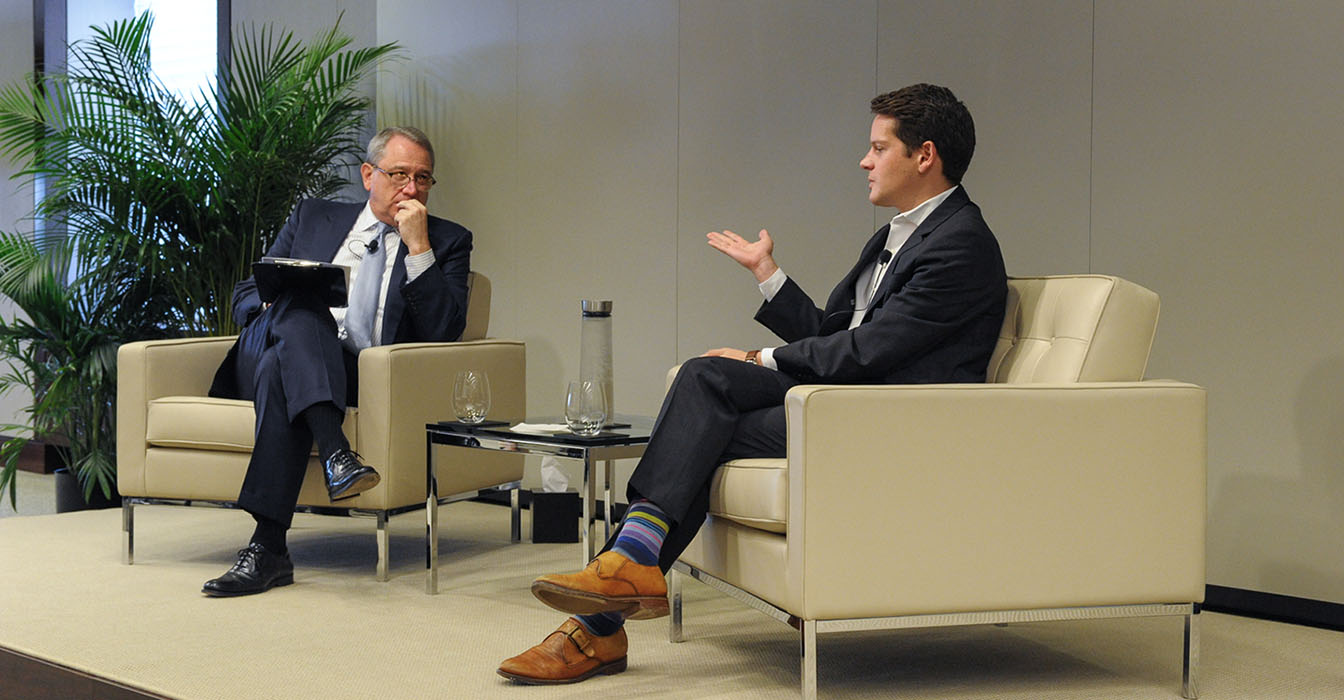Consider the Lawyer: How a Young Paul Cravath Took on Edison
By Katrina Dewey | August 29, 2016 | News Articles, News & Features, Cravath Features

Cravath Presiding Partner C. Allen Parker talked with author Graham Moore. (Photo ©2016 David Lubarsky)
The name Paul Cravath is one of the most enduring in American legal history. But in 1883, he was just another young attorney in vastly over his head representing George Westinghouse against Thomas Edison in the battle to electrify the United States.
Then 26 and the lowliest partner in a downtown Manhattan law firm of three, Cravath is surprisingly hired by Westinghouse to defend the trial of the century - the 19th century, that is. And it wasn't just one trial, but 312 patent infringement claims plus a lawsuit to invalidate Edison's lightbulb patent that the young attorney was called upon to wage almost singlehandedly.
Cravath’s world as imagineered by Graham Moore, the author of “The Last Days of Night,” is a tour de force of the young attorney as he moves from Columbia Law School graduate to ambitious young attorney, 1880s style.
There were many times, Moore wrote, when Cravath “could only hope to fall from ever-greater heights.”
And, for awhile, that is the one thing at which he succeeded.
Moore travelled to Cravath to discuss his fictionalized recounting of the so-called “current wars” in front of 150 firm lawyers. No relation to the firm’s 7th presiding partner, Hoyt Moore, the author spoke with Cravath’s current and 15th presiding partner, the renowned C. Allen Parker. [Read also our "Writer Limelight" with Moore for an in-depth discussion of his book.]
Moore writes of Cravath’s strategy in what we’d now call the bottom of the 9th with bases loaded for the opponent, leading 100-0: “Paul had no idea how he felt anymore. He had only to press forward.”
And so he did – in the book securing an invitation to the Metropolitan Opera’s New Year’s Eve celebration where he bided his time before pouncing on the era’s richest man – and his true adversary, J.P. Morgan, who owned 60 percent of Edison General Electric. Cravath persuaded Morgan that it was only a matter of time until both Edison and Westinghouse went broke, striking a deal that averted bankruptcy for Westinghouse, ousted Edison from his company and spread light throughout the land, ushering in America’s industrial age.
Moore’s geeked-out passion for the mathematician Alan Turing won him an Academy Award for the screenplay of “The Imitation Game.” He is now working on the film adaptation of “Night,” in which Eddie Redmayne will play Cravath. The film is being produced and directed by the same team behind the highly lauded “Imitation Game.”
To re-create the battle, Moore spent five years living with Paul in his head, thinking about how he felt, what he ate, how he overcame his doubts to persevere for his client. And he grew quite fond of him.
“I miss Paul,” Moore said, in an interview at Cravath.
Cravath later married Agnes Huntington, his romantic interest in the book, and the two became important figures in early 20th Century New York. He went on to serve as a founder of the Council on Foreign Relations and chairman of the Metropolitan Opera. But no institution bears his imprint more than Cravath, Swaine & Moore.
Amidst his work for Westinghouse, Cravath observed how inventors leveraged their ideas through teams of workers to turn the filament of their minds into products that consumers could use. So, Cravath reasoned, the same process could apply to law – which at the time was organized into firms of two or three lawyers, at most, each of whom did every task on a matter.
In “Night,” Cravath returns to Columbia and hires four students whom he promptly deposits in a side office on Greenwich Street to dig through masses of documents and find the inconsistency in Thomas Edison’s patent application on the light bulb. Though the book conflates events, and nudges history with a little gossamer of drama, it captures the birth of the modern law firm with largely anonymous young men doing the blinding archaeological dig to unearth the winning facts that Cravath then turns into his winning tale.
Today’s Cravath handles the world’s biggest trials and deals, with 500 lawyers in New York and a small London office.
Parker asked Moore what it felt like to be such a huge success. The charming Moore seemed momentarily taken aback, looked at Parker, and responded, “You’re asking me what it is to be a big success?”

